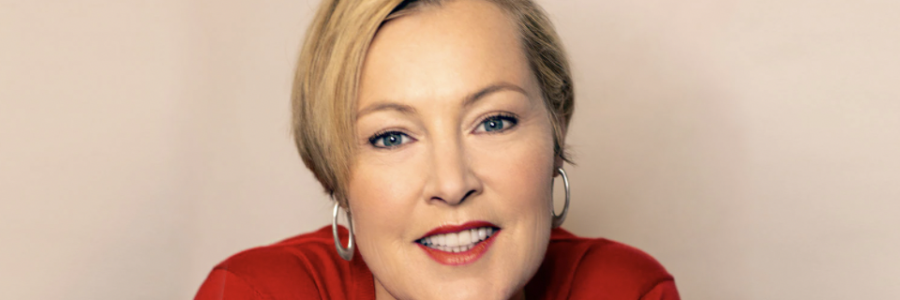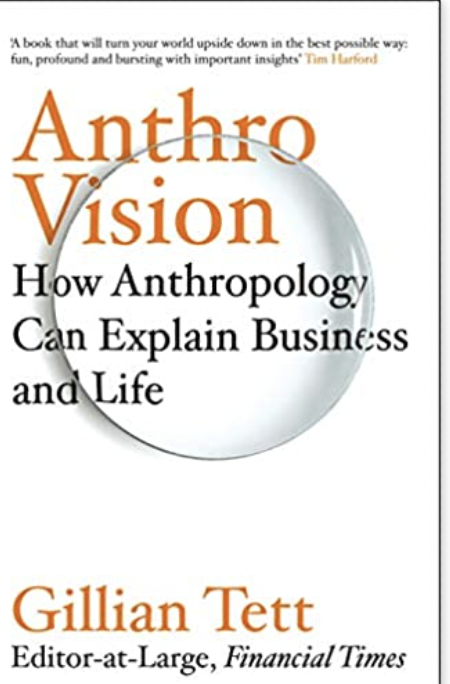
Anthropology makes sense of human behaviour in business and beyond


Financial Times journalist and anthropology PhD, Gillian Tett’s Anthro-Vision is an essential reading for anyone working to rebuild a more equal world that solve twenty-first century problems. For centuries anthropologists have immersed themselves in unfamiliar cultures uncovering the hidden rituals that govern how people act. A new generation of anthropologists are using these methods in a different context- to illuminate the behaviour of consumers and businesses at home.
Tett charts how anthropology helps explain consumer habits -revealing the “webs of meaning” that underpin how anthropology can shed light on the workplace, identifying the hidden tribes within the office, and pinpointing which rituals are binding together a team. She reveals how we can all use anthropology in our lives, too helping us kea better decisions, navigate risk even work out what our peers are really thinking.
Tett provide us with a new intellectual framework and draws stories from Tajik villages and Amazon warehouses, Japanese classrooms and Wall Street trading floors, all to reveal the power of anthropology in action.
Anthro-vision can fundamentally transform how we approach solving society’s most wicked problems. It’s the timely call for decision-makes to wean themselves off their dependency o big data and embrace the full complexity of human life.
The result in a new way men sense of human behaviour in short-sighted world.
The skills she acquired studying the marriage rituals in Tajikistan gave her a way of seeing- lateral vision, asking questions – assuming nothing – that notably yielded awards when she predicted the financial crisis in 2007-08. She can help us understand ourselves, our tribes, companies, communities and to reduce our wilful blindness.
Tett describes how anthropology fuelled her journalism with open-embed curiosity, interpreting markets through their symbols, rituals, illuminated early the dangerous isolation of the financial sector, later, the growth of ESG investing. The tech sector was starting to look the pre-crash finance in its arrogance, wealth and isolation from reality- was just as important.
Engineers are like bankers isolated by power, money and language that no one else understands, and impose their value on their products which force us to behave in constrained ways, undermining our autonomy.
The tech lash have been fuelled by the assumptions technologists made – about voters, consumers, students and teachers-without any engagement with those communities. Text says work with these communities and understand their values and concerns rather than against them.
We have been sold a myth that with enough hard data, we can know everything. But numbers can only show what is:they don’t reveal why. Soft data is what anthropology reveals the meaning behind behaviours. In Japan, a Kit-Kat is not a relaxing snack (“Have a break”, it is a good luck charm. In Malaysia and Singapore, a car isn’t just a machine for travelling, it is also a haven for social safety that people treat a lot like home.
Anthropological insights don’t come form surveys but from fieldworks, directly observing and talking to people.
Without such understanding, we force-fit meaning on to others, make costly mistakes and miss opportunities for knowledge, innovation and legitimacy.
The scientific management of the metrics to assess everything from productivity to employee mood has not prevented business failures.
Focus on returns raised no concerns about some reckless banks pre-2007, but the practice of awarding cash or cabbages to high or low performers would have caught an anthropologist’s eye.
After each fiasco, the culture deemed to be he culprit, HR deputed to design surveys and the ensuing change programmes which mostly fail.
Anthropologists whose study is the social systems of meaning, could bring more pragmatic insight. Decades of leadership and teamwork consulting have focused on retaining individuals, whereas unpacking webs of collective meaning could untangle knotted collaboration.
Google’s errors to pandemic beards, Tett explains anthropological revelations invisible to computers. The toxic Home Office, the flailing Church of England or our failure to design really good education systems. Where data scientists and ideologists asserts, anthropologists could reveal.
Inventing words in the hope of creating a brand has become tiresome in business publishing.
Social Sciences and humanities have the power to reveal what otherwise remains obscure.
It is time for decision makers to free themselves off their dependency on big data and embrace the full complexity of human life.
Anthro-Vision : How Anthropology Can Explain Business and Life by Gillian Tett, Random House Business £20, 304 pages.
Financial Times journalist and anthropology PhD, Gillian Tett’s Anthro-Vision is an essential reading for anyone working to rebuild a more equal world that solve twenty-first century problems. For centuries anthropologists have immersed themselves in unfamiliar cultures uncovering the hidden rituals that govern how people act. A new generation of anthropologists are using these methods in a different context- to illuminate the behaviour of consumers and businesses at home.
Tett charts how anthropology helps explain consumer habits -revealing the “webs of meaning” that underpin how anthropology can shed light on the workplace, identifying the hidden tribes within the office, and pinpointing which rituals are binding together a team. She reveals how we can all use anthropology in our lives, too helping us kea better decisions, navigate risk even work out what our peers are really thinking.
Tett provide us with a new intellectual framework and draws stories from Tajik villages and Amazon warehouses, Japanese classrooms and Wall Street trading floors, all to reveal the power of anthropology in action.
Anthro-vision can fundamentally transform how we approach solving society’s most wicked problems. It’s the timely call for decision-makes to wean themselves off their dependency o big data and embrace the full complexity of human life.
The result in a new way men sense of human behaviour in short-sighted world.
The skills she acquired studying the marriage rituals in Tajikistan gave her a way of seeing- lateral vision, asking questions – assuming nothing – that notably yielded awards when she predicted the financial crisis in 2007-08. She can help us understand ourselves, our tribes, companies, communities and to reduce our wilful blindness.
Tett describes how anthropology fuelled her journalism with open-embed curiosity, interpreting markets through their symbols, rituals, illuminated early the dangerous isolation of the financial sector, later, the growth of ESG investing. The tech sector was starting to look the pre-crash finance in its arrogance, wealth and isolation from reality- was just as important.
Engineers are like bankers isolated by power, money and language that no one else understands, and impose their value on their products which force us to behave in constrained ways, undermining our autonomy.
The tech lash have been fuelled by the assumptions technologists made – about voters, consumers, students and teachers-without any engagement with those communities. Text says work with these communities and understand their values and concerns rather than against them.
We have been sold a myth that with enough hard data, we can know everything. But numbers can only show what is:they don’t reveal why. Soft data is what anthropology reveals the meaning behind behaviours. In Japan, a Kit-Kat is not a relaxing snack (“Have a break”, it is a good luck charm. In Malaysia and Singapore, a car isn’t just a machine for travelling, it is also a haven for social safety that people treat a lot like home.
Anthropological insights don’t come form surveys but from fieldworks, directly observing and talking to people.
Without such understanding, we force-fit meaning on to others, make costly mistakes and miss opportunities for knowledge, innovation and legitimacy.
The scientific management of the metrics to assess everything from productivity to employee mood has not prevented business failures.
Focus on returns raised no concerns about some reckless banks pre-2007, but the practice of awarding cash or cabbages to high or low performers would have caught an anthropologist’s eye.
After each fiasco, the culture deemed to be he culprit, HR deputed to design surveys and the ensuing change programmes which mostly fail.
Anthropologists whose study is the social systems of meaning, could bring more pragmatic insight. Decades of leadership and teamwork consulting have focused on retaining individuals, whereas unpacking webs of collective meaning could untangle knotted collaboration.
Google’s errors to pandemic beards, Tett explains anthropological revelations invisible to computers. The toxic Home Office, the flailing Church of England or our failure to design really good education systems. Where data scientists and ideologists asserts, anthropologists could reveal.
Inventing words in the hope of creating a brand has become tiresome in business publishing.
Social Sciences and humanities have the power to reveal what otherwise remains obscure.
It is time for decision makers to free themselves off their dependency on big data and embrace the full complexity of human life.
Anthro-Vision : How Anthropology Can Explain Business and Life by Gillian Tett, Random House Business £20, 304 pages.
